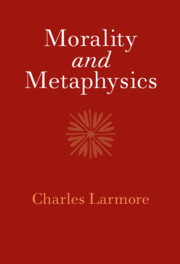Book contents
- Morality and Metaphysics
- Morality and Metaphysics
- Copyright page
- Contents
- Acknowledgments
- Introduction
- Part I The Structure and Scope of the Moral Point of View
- Part II Self and World
- Chapter 5 Kant and the Meanings of Autonomy
- Chapter 6 Moral Philosophy and Metaphysical Evasion
- Chapter 7 The Conditions of Human Freedom
- Chapter 8 Self-Knowledge and Commitment
- Index
Chapter 7 - The Conditions of Human Freedom
from Part II - Self and World
Published online by Cambridge University Press: 09 June 2021
- Morality and Metaphysics
- Morality and Metaphysics
- Copyright page
- Contents
- Acknowledgments
- Introduction
- Part I The Structure and Scope of the Moral Point of View
- Part II Self and World
- Chapter 5 Kant and the Meanings of Autonomy
- Chapter 6 Moral Philosophy and Metaphysical Evasion
- Chapter 7 The Conditions of Human Freedom
- Chapter 8 Self-Knowledge and Commitment
- Index
Summary
This chapter develops a conception of freedom that is at once rationalistic – our thought and action are free insofar as we follow our best understanding of the reasons relevant to the situation at hand – and compatibilistic – we are no less free if our thought and action also have their place in the causal order of nature, where by “nature” is meant the totality of all physical and psychological facts, which constitute the domain of the sciences. Both components are defended. But in addition the problem is confronted of how they can be combined, given what reasons are actually like. For reasons themselves are essentially normative in character and so, as such, not part of nature. How then can our thought and action be free in responding to the reasons there are and yet at the same time be shaped by the causal order of nature? The problem has to do with how reasons (not simply our ideas of reasons) can be causes, and this chapter explains how it is possible.
- Type
- Chapter
- Information
- Morality and Metaphysics , pp. 172 - 210Publisher: Cambridge University PressPrint publication year: 2021

